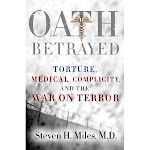The following is a press release from The Lancet, describing an important new article on the question of medical ethics in relation to the torture of prisoners. It is reproduced here:
A Viewpoint in this week’s edition of The Lancet discusses how the 1975 Declaration of Tokyo, on Medical Ethics and Torture, could be further revised to make it more relevant to the world today — making sure that physicians who are complicit in torture of prisoners are held to account. The Viewpoint is written by Dr Steven Miles, Center for Bioethics, University of Minnesota, MN, USA, and Dr Alfred Freedman, New York Medical College, USA.Of special interest in Miles and Freedman's article is their delineation of what they call unofficial teaching definitions of torture and cruel, inhumane, and degrading treatment or punishment. (The article covers the de jure definitions, as well). These two categories are often buried in legalese and, therefore, confusion. Their "unofficial definition" is meant to cut through the obfuscations:
Medical complicity with torture and abuse of prisoners is common in the roughly 100 countries that practise torture. Physicians devise ways to keep physical scars to a minimum, certify prisoners as fit for abuse, monitor vital signs during mistreatment, and give approval to intensify abuse. A third to half of torture survivors report physicians overseeing the abuse; this number does not include those who do not see physicians being accomplices of the abuse and those who die of torture that a physician, either willingly or under coercion, certifies as death by natural causes. Many more physicians are complicit with abusing prisoners than work in programmes to treat torture survivors.
The World Medical Association’s (WMA) Declaration of Tokyo has been a landmark event in medical ethics. It was passed in 1975, and has undergone several revisions. The declaration condemns medical participation in torture, and cruel, inhuman, or degrading treatment, or any act to diminish the ability of the victim to resist such treatment. It serves as a template for many medical codes. Although the WMA updated the Declaration of Tokyo in 2006, a revised version might further clarify medical roles and duties in countries where prisoners are abused.
The authors propose four manners in which the code should be revised. First, it should incorporate authoritative definitions of torture and cruel, inhuman, and degrading treatment, to harmonise this medical ethics code with international law and, thereby, communicate the accountability of physicians to international law. Second, a revision of the Declaration of Tokyo should incorporate some of the good ideas recently endorsed by various clinical societies — for example, a death certificate should be publicly posted for every death in custody, as is currently mandated for prisoners of war by a Geneva Convention. False or non-issued death certificates conceal torture. Third, a revision of the Declaration of Tokyo must commend ways for holding physicians professionally and criminally accountable for abetting abuse of prisoners — including those who flee the country where the abuse occurred and attempt to obtain a licence to practice elsewhere. Finally, a revision of the Declaration of Tokyo should be readable by a person with 12 years of education — the current version needs advanced collegiate-grade reading skills, with its average sentence containing more than 30 words.
The authors conclude: “The medical community is key to the campaign against torture. Governments that practice torture need complicity of prison medical personnel. Furthermore, a profound link exists between domestic torture and worldwide medical solidarity against torture. A physician community that acquiesces to abuses by its members undermines its credibility in protesting against foreign medical communities or colleagues who abet torture. Accordingly, physicians and their societies must act on their duty to promote prisoners’ wellbeing, access to prisons, skills at identifying abuse, and membership of civil society.”
Torture is any act that intends to cause a prisoner to feel severe physical or mental pain or suffering. Torture occurs when a government official orders, supervises, consents to, allows, or performs acts that cause such pain or suffering.Furthermore:
Torture is unacceptable for any reason, including when it is used to:
-- obtain information or a confession from the tortured person or someone else or
-- punish the tortured person or someone else for an act that he or she has done or is suspected of having done or
-- frighten or coerce the tortured person or someone else or
-- discriminate against a race, religion, political belief
-- or any other reason
This definition does not include pain or suffering that is caused by legal prison conditions and sentences
Cruel, inhumane, or degrading treatment or punishment is any physical or mental abuse. Among other things, it includes depriving a prisoner of sight, hearing, and awareness of place or the passing of time.
A physician [or any treating professional, such as a psychologist] should not:Miles and Freedman note that there is a "pandemic of torture" going on in the world. The attempt to squeeze torture techniques into the U.S. Army Field Manual, and furthermore cover up the attempt, is only one aspect of this frightening spread of the torture cancer. Arm in arm with it, there is an attack on civil liberties in general, and a glorification of militarism and brutality in public life and political action. The invasion and attack on Gaza, the missile attacks by U.S. robot aircraft in Afghanistan and Pakistan, the massive death of civilians in Iraq, the Congo, Somalia, and elsewhere around the world are part and parcel of the torture ethic, which reduces human beings to mere things, despised objects, and victims of national greed and will.
-- assist with torture and cruel, inhuman, or degrading treatment or punishment
-- be present when a prisoner is subject to, or threatened with, torture and cruel, inhumane, or degrading treatment
-- provide or withhold clinical facilities, equipment, supplies, or knowledge to support torture and cruel, inhuman, or degrading treatment
-- assist procedures that aim to decrease a prisoner's ability to resist interrogation or punishment;
-- withhold, or threaten to withhold, medical assessment or treatment from a prisoner who is not cooperating with officials;
-- assist in certifying a prisoner's fitness for interrogation, treatment, or punishment that might harm that person's physical or mental health
-- assist in monitoring an interrogation, treatment, or punishment to advise officials to modify procedures that might harm a prisoner's physical or mental health.





